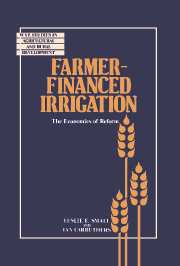Book contents
- Frontmatter
- Contents
- Preface
- 1 Irrigation financing in perspective
- Part I Analysing financing policies: theory and concepts
- Part II Criteria for evaluating irrigation financing policies
- Part III Financial autonomy and user fees: key implementation issues
- 9 Establishing financial autonomy
- 10 Setting irrigation fees: reconciling the need for funds with farmers' ability to pay
- 11 Collecting irrigation fees: fostering a willingness to pay
- 12 The political economy of irrigation financing
- 13 Conclusions and recommendations
- Notes
- Index
11 - Collecting irrigation fees: fostering a willingness to pay
Published online by Cambridge University Press: 05 November 2011
- Frontmatter
- Contents
- Preface
- 1 Irrigation financing in perspective
- Part I Analysing financing policies: theory and concepts
- Part II Criteria for evaluating irrigation financing policies
- Part III Financial autonomy and user fees: key implementation issues
- 9 Establishing financial autonomy
- 10 Setting irrigation fees: reconciling the need for funds with farmers' ability to pay
- 11 Collecting irrigation fees: fostering a willingness to pay
- 12 The political economy of irrigation financing
- 13 Conclusions and recommendations
- Notes
- Index
Summary
Introduction
Even the best designed system of irrigation fees can be destroyed quickly by low rates of collection of the fees assessed. Low collection rates create severe inequities. It is obviously inequitable for some water users to pay for their irrigation services while others do not. And if the irrigation agency is financially autonomous, this inequity is even greater because the failure to collect fees from some water users must be reflected in higher rates of assessments. Thus those who pay their fees are in effect paying not only for the services they receive, but also for the services received by those water users who have failed to pay. If such a situation prevails for long, the credibility of the fee system is likely to deteriorate, with rates of collection dropping even further.
Discussions about fee collections sometimes focus exclusively on questions of enforcement. Although enforcement is important, we wish to emphasise that it is only one aspect of the collection of irrigation fees. More generally, we need to be concerned with all the conditions (including enforcement) which create a willingness to pay on the part of the water users. This means that we need to be concerned with positive incentives for the water users to pay, as well as with penalties established as a means of enforcement. Furthermore, we need to consider how institutional conditions can affect the willingness of the users to pay their irrigation fees.
- Type
- Chapter
- Information
- Farmer-Financed IrrigationThe Economics of Reform, pp. 182 - 202Publisher: Cambridge University PressPrint publication year: 1991

